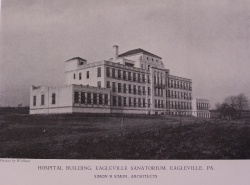Eagleville Sanitarium
| Eagleville Sanitarium | |
|---|---|
 | |
| Opened | September 16, 1909 |
| Current Status | Active |
| Building Style | Single Building |
| Alternate Names |
|
History
On February 8, 1909, a group of philanthropists gathered at the home of Dr. Abraham J. Cohen in Philadelphia. Their goal was to open a sanatorium near Philadelphia that would treat indigent individuals suffering from tuberculosis, which was the leading cause of death in Europe and North America. At that time, substance abuse was not recognized as a disease requiring treatment. Known also as the "white plague," tuberculosis did not discriminate; it imposed itself on all levels of society. Unfortunately, impoverished individuals who were afflicted with the disease had a low chance of survival because treatment options were limited and costly.
Under the direction of Dr. Cohen and several other professionals, the groundwork for such a challenging and ambitious project came to fruition. The group purchased a country farm from one of Dr. Cohen’s former tuberculosis patients, who had recovered from the disease and returned to their Philadelphia residence. One of Dr. Cohen’s original supporters, Solomon C. Krauss, offered the owner $100 of his own money as a down payment on the land which was obtained for $6,500.
As one of the founders of the Philadelphia Jewish Sanatorium for Consumptives, as it was first called, Mr. Krauss and other dedicated and generous individuals, began the transformation of a country farm into a fully operational tuberculosis hospital. Less than eight months from the first meeting, on September 16, 1909 the sanatorium opened its doors to four patients. Those suffering from the white plague received unparalleled treatment and compassion during their stay at the sanatorium. Through the decades the sanatorium continued to grow. In 1959, the sanatorium celebrated "Fifty Years of Progress in the Treatment of Tuberculosis."
The sanatorium was affiliated with several professional organizations, and was a member of the Philadelphia Hospital Council, the Hospital Association of Pennsylvania, the American Hospital Association, Delaware Valley Hospital Council, and the Federation of Jewish Agencies.
By the mid-1960s there were numerous changes in the medical field. The state had taken over the treatment of tuberculosis, and streptomycin and other antibiotics were discovered to effectively treat tuberculosis. Eagleville had to seriously reconsider its mission as a tuberculosis sanatorium. After discovering that many tuberculosis patients also suffered from chronic alcoholism, the board members agreed to convert the facility into a specialized treatment center for men who suffered from addiction to alcohol. On July 28, 1965 the sanatorium officially changed its name to Eagleville Hospital, specializing in the treatment of alcohol addiction.
In 1968, Eagleville pioneered a new approach to addiction treatment adding a program for drug addiction. The treatment programs were expanded in 1969 when Eagleville admitted the first women to the hospital for the treatment of substance abuse. Eagleville’s growth as a drug and alcohol rehabilitation facility progressed to include a variety of community outreach programs. To become more accessible to individuals suffering from addiction, the hospital established a halfway house and a day hospital in Norristown, and counseling and therapy programs for prisoners at Graterford. The hospital also initiated education programs such as the Montgomery County Community Day School program, which offered an alternative to institutionalization for troubled adolescents. Eagleville was also instrumental in the creation of a performance based master's degree program in human services offered through Lincoln University. The program accepted students on the basis of proven experience and requisite academic skills.
In 1975, Eagleville opened Family House, a nationally recognized program that provided residential treatment for recovering alcoholics and drug addicted women and their children. Although it is no longer under the management of Eagleville, Family House continues to fulfill its original mission. Through the decades, Eagleville has earned national recognition and attracted medical students and doctors from around the world interested in learning about the Hospital's treatment techniques.
Governed by the Eagleville Foundation, Eagleville Hospital is state licensed and accredited with commendation by the Joint Commission on Accreditation of Healthcare Organizations (JCAHO). Eagleville Hospital provides a variety of programs including medically supervised detoxification, specialized inpatient programs for men and women, a medical specialty unit, dual diagnosis programs, and non-hospital programs.
Over the years, healthcare systems have experienced many changes. However, under the inspired leadership of the Eagleville Foundation, Eagleville Hospital continues the mission which began over a century ago. Eagleville continues to offer high quality residential care to those in need of treatment for alcohol and drug addiction. Eagleville Hospital continues to provide new and better ways to treat addictive disease, using the most recent techniques, delivered by skilled professionals.[1]